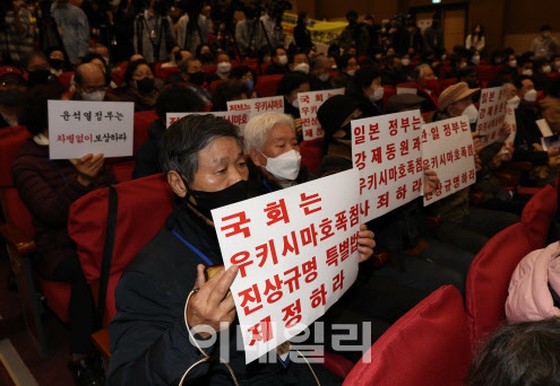 |
According to South Korea's Ministry of Foreign Affairs (equivalent to Japan's Ministry of Foreign Affairs), on the same day, Seo Min Jeong, former director of the Asia-Pacific Bureau of the Ministry of Foreign Affairs in charge of the issue of forced labor, met with Takehiro Funakoshi, director of the Asia-Pacific Bureau at the Ministry of Foreign Affairs of Japan. Discussed issues of concern between the two countries. South Korea's Ministry of Foreign Affairs said in a press release, Director Seo Min Jeong conveyed the atmosphere in the country, such as the public debate on resolving the issue of forced labor on the 12th." We decided to continue close communication between us."
Earlier, the South Korean government announced a plan for the Victim Support Foundation, a public-interest corporation under the Ministry of Public Administration and Safety, to repay compensation by using donations from domestic companies as financial resources. The South Korean government's plan is to create a foundation fund through domestic companies such as POSCO, which benefited from the 1965 Japan-Korea Claims Settlement Agreement, and then have Japanese defendant companies participate. Victims protested, saying, "We cannot accept a solution that does not offer a sincere apology from Japan and that the defendant companies do not participate in the payment of compensation."
So far, the Japanese government has upheld the principle that the issues related to former forced laborers had already been resolved at the time of the Japan-Korea Claims Agreement. However, the majority of diplomats say that internally, the mood is that the South Korean proposal is reasonable. Not only that, it also mentions a donation plan through the Federation of Economic Organizations in Japan.
In fact, immediately after the public debate, Japan's 'Kyodo News' evaluated the solution as 'realistic,' citing a government official and stating, "A claim to demand the defendant company to return the compensation paid by the foundation. If they give up their rights, there is a plan to allow Japanese companies to donate to the foundation." However, it is still unclear whether the donations by the defendant companies or those of other Japanese companies will be tolerated.
Japan has not yet taken an official position on the South Korean government's solution, but Prime Minister Fumio Kishida made a meaningful remark that drew attention. During his visit to the United States, Prime Minister Fumio Kishida expressed his intention to improve relations between Japan and South Korea, stating, "We will resolve outstanding issues as quickly as possible and restore Japan-South Korea relations to a healthy form." Prime Minister Fumio Kishida is believed to be referring to the issue of former forced laborers, and he expressed his intention to quickly resolve this issue and restore relations.
On the other hand, some are of the view that the possibility of Japanese companies participating in donations is promising. Although the South Korean government has denied that the third-party repayment method is the final plan, some speculate that it cannot be announced without a certain level of sympathy between Japan and South Korea.
Choi Eun-mi, a researcher at the Asan Institute for Policy Research, said, "It seems difficult to assume that Japan was completely unaware of the parts to be announced in South Korea. The South Korean government has done everything it can to avoid public opposition. Next, it will be quite important how aggressively Japan will step up."
Of course, just because an agreement has been reached between the two countries, the problem is not resolved. The former forced laborers are demanding not only Japan's official apology, but also a firm principle that the defendant company, which is the responsible party, must directly start paying the judgment money. The South Korean government said it would go through the process of directly visiting the plaintiffs, the victims and their bereaved families, asking them if they would like to receive compensation and seeking their consent.
An official of the Institute for Ethnic Issues, which supports former forced laborers, said, "The key is to have companies that have been judged by the Supreme Court participate" he said.
2023/01/17 12:49 KST


